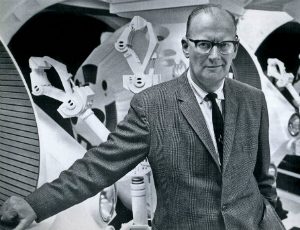As we approach the 100th anniversary of Sir Arthur C. Clarke’s birth on December 16, it's hard to say which of the foundational elements he contributed to science fiction is the most compelling. Clarke lived his life at the intersection of the genre, believing profoundly in the power of fiction to ignite the imagination while championing real-world scientific efforts such as space programs and interplanetary travel.
Clarke wrote multiple short stories, compiled in The Collected Stories of Arthur C. Clarke, and many novels. Perhaps most famously, he co-wrote 2001, A Space Odyssey with Stanley Kubrick as a novel and screenplay, and later authored a number of sequels.
Clarke, who had a degree in mathematics and physics, was also known for his nonfiction essays about scientific innovations. In 1969, on the occasion of the United States landing men on the moon, Clarke, together with fellow science fiction author Robert Heinlein, was interviewed by Walter Cronkite. A passionate futurist, he predicted the evolution of home computer use, as well as the likelihood of portable phones and a GPS system. You can read up on his predictions in Greetings, Carbon-based Bipeds!
And you can hear his predictions about the internet—and how accurate they are—in this video:
Clarke was gay at a time when there was little social acceptance for the LGBTQ+ community. He was knighted by the British government May 26, 2000. In his later years he communicated with fans mostly through recordings, finding it difficult to travel because of post-polio syndrome.
The Arthur C. Clarke Award annually recognizes the best science fiction novel first published in the United Kingdom. Another award is given in his name for scientific achievements.



Add a comment to: A Century of Science Fiction Legend Arthur C. Clarke